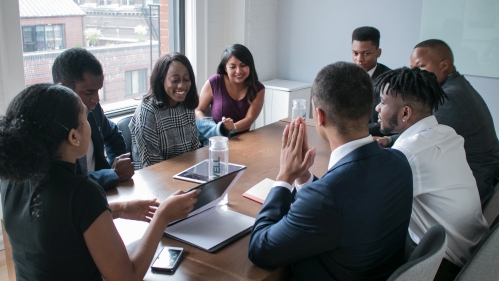
The RDL Faculty and Staff Associates Program empowers Rutgers faculty and staff to develop bold, interdisciplinary solutions to the complex challenges facing American democracy. Funding up to $30,000 for selected proposals creates a unique opportunity to execute innovative projects with real-world impact.
RDL Faculty and Staff Associates Program
Please Note: 2025 applications have closed. Please check back in the Spring 2026 semester for the 2026-2027 academic year application.
Purpose: The RDL Faculty and Staff Associates Program will support the creation of innovative multi-and cross-disciplinary ideas to address complex, democratic problems. The theme for 2025-2026 is Inspiring Democratic Engagement.
Who should apply: Faculty (non-tenured faculty and lecturers are eligible to apply) and staff from any/all units at Rutgers-New Brunswick, Rutgers-Camden, Rutgers-Newark, and Rutgers Health.
Submission deadline: applications are accepted on a rolling basis. Projects may begin as soon as summer 2025.
Questions about this opportunity may be directed to Ava Majlesi, Chief Operating Officer of the Rutgers Democracy Lab.
Proposal Details:
Students are at the heart of the Rutgers Democracy Lab, so we strongly encourage their incorporation into all project proposals. Project formats and work products can take many forms, including but not limited to:
- Qualitative/quantitative research (any research involving human subjects requires IRB review approval)
- Educational modules/toolkits
- New coursework or development of existing course enhancements
- Training programs/workshops
- Podcasts
- Social media content
- Ted Talk-style programs
Depending upon the proposal, selected RDL Faculty Associates and RDL Staff Associates are required to produce a set of deliverables, including:
- Work products that can be featured on the RDL website (e.g., report, article, white paper, explainer videos, webinar)
- Participation in an RDL symposium highlighting completed work/outcomes
- Social media content
- Syllabi, course content, or programming materials from RDL-sponsored projects
Need Inspiration?
Consider the following examples (applicants are encouraged to be creative so long as ideas fall within the RDL’s inaugural theme):
- Creating and implementing a video game that will increase civics knowledge for middle school children
- Creating and implementing a podcast to increase awareness of societal issues impacting American voters
- Designing a digital campaign that encourages respectful dialogue, measuring its impact, and featuring it on RDL’s social media channels
- Launching a public art campaign highlighting the power of people in directing change.
- Producing a guide/manual on best practices for using social media for social good or etiquette for constructive engagement on social media platforms
- Pursuing research on effective voter mobilization techniques, tactics for reducing partisan polarization, the impacts of social media on democratic institutions, etc.
- Proposing a technological advancement or solution that will have implications for democratic processes.
- Creating an educational program to address societal challenges such as climate change or health crises.
- Developing and testing a scientific literacy module that allows users to develop a greater understanding of the importance of science in shaping democratic decisions and building trust in scientific institutions.
Proposal Submission Requirements:
- Resume for each faculty/staff member(s) involved in the project
- Proposal addressing the following areas (3 pages maximum):
- Project overview: What problem are you trying to solve and how might you solve it?
- Statement of the problem: what issue/challenge will this project attempt to solve and why?
- Project timeline and implementation: How long will it take to implement (one semester or two?) and what steps are necessary to complete the project?
- Deliverables: what will be the output of this project? See examples above.
- Impact: What impact do you foresee as a result of the project?
- Budget (Excel spreadsheet): Faculty/staff may request up to $30,000 dollars to fund a project. Line items can include, but are not limited to:
- Stipend(s) to compensate student(s) for time spent on the project. For example, student fellows might receive a $2,000 total stipend for 10-15 hours of work each week spent on the project for the duration of semester
- Software expenses
- Equipment
- Event costs (food, event space)
- Printed materials
- Supplies
- Training/Travel Costs
- Portion of faculty/staff salaries/fringe
- Budget Justification: a short narrative should accompany the budget, outlining rationale behind each budget line item.